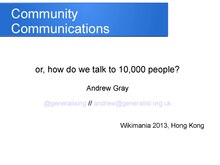Submissions/Community communications: how do we talk to a hundred thousand people?
Appearance
|
This is an accepted submission for Wikimania 2013. |
|
Presentation Media
|
- Submission no.
- 3033
- Subject no.
- D1
- Title of the submission
- Community communications: how do we talk to a hundred thousand people?
- Type of submission
- Presentation
- Author of the submission
- Andrew Gray
- Country of origin
- UK
- Affiliation
- E-mail address
- wiki
 generalist.org.uk
generalist.org.uk
- Username
- user:Andrew Gray
- Personal homepage or blog
- http://www.generalist.org.uk/
- Abstract
- One of the traditional complaints by members of the Wikimedia community is "I didn't know about that decision!"; just as traditional is the opposite complaint, "stop spamming me with all these messages!". Can we find a middle ground? How can we get the right messages to the right people, without missing anyone out, and without overwhelming everyone?
- This talk will look at the various types of communications channels currently in use in the Wikimedia movement and on the projects, including the newly developed Echo notification system, and discuss what works and what doesn't for getting information to the right users.
- Detailed proposal
- The Wikimedia community has always had a communications problem. The difficulties of communicating with groups in 270 languages are well known, but even within a single-language context, we tend to have a variety of different ways of sending messages - on the English Wikipedia alone, there is the bewildering choice of direct contact with users on talkpages or by email, messages for wikiprojects, community noticeboards and village pumps, targeted geonotices, untargeted watchlist notices, sitenotices and centralnotices (for registered users or for everyone), wikiproject newsletters, the Signpost; as well as this, there are dozens of mailing lists, IRC, blogs, offsite forums, meetups, and even a growing number of formal conferences.
- What are we trying to achieve? There are two main themes to this constant stream of messages:
- "Editorial" discussions
- On any project, the bulk of the communication is editorial - it's related to the projects and how they function. A lot of this is user-to-user or on talk pages, and works reasonably well. However, large projects have growing problems with broader discussions - either they don't attract very many people or they grow large and complex. A lot of debates are splintered across four or five places, and it can be very hard for most users to come across discussions that will, in time, directly affect their work. This can cause problems of legitimacy, when people challenge the results feeling they did not have a say, and ineffective decision-making processes when only a small group participate.
- "Meta" information
- Above and beyond the individual, there is a wide range of communication about broader "movement" issues. These include WMF and chapter topics, such as fundraising or elections; advertising for local events; recruiting for surveys; or announcements of technical changes. The main discussions for these tend to take place elsewhere, and so much of the meta information is oriented towards advertising and promoting the discussions - it is a very top-down one-way system.
- One problem - beyond the scope of this talk - is that these main discussions tend to get low participation. More pressingly, however, many people are simply unaware of the announcements.
- The talk will summarise these types of communication, and look at the way in which they use different channels and methods. Hopefully, we will be able to get a sense of what works well and what needs rethinking!
- Note: due to time constraints, this talk won't cover issues such as:
- press and public relations
- translation
- cross-language\cross-cultural communication
- Track
- WikiCulture and Community
- Length of presentation/talk
- 25 Minutes
- Language of presentation/talk
- English
- Will you attend Wikimania if your submission is not accepted?
- Yes!
- Slides or further information (optional)

- Special requests
Interested attendees
If you are interested in attending this session, please sign with your username below. This will help reviewers to decide which sessions are of high interest. Sign with four tildes. (~~~~).
- Daniel Mietchen (talk) 23:12, 29 April 2013 (UTC)
- Ocaasi (talk) 16:19, 30 April 2013 (UTC)
- Blue Rasberry (talk) 17:14, 30 April 2013 (UTC)
- MPelletier (WMF) (talk) 19:30, 30 April 2013 (UTC)
- Maximilianklein (talk) 23:03, 30 April 2013 (UTC)
- Mglaser (talk) 23:45, 30 April 2013 (UTC)
- Sharihareswara (WMF) (talk) 23:59, 30 April 2013 (UTC)
- Bishdatta (talk) 17:35, 2 May 2013 (UTC)
- Lydia Pintscher (WMDE) (talk) 16:04, 3 May 2013 (UTC)
- Ziko (talk) 16:08, 3 May 2013 (UTC)
- Micru (talk) 19:03, 4 May 2013 (UTC)
- Axel Pettersson (WMSE) (talk) 12:59, 6 May 2013 (UTC)
- Waldir (talk) 11:20, 7 May 2013 (UTC)
- --Netha Hussain (talk) 08:37, 9 May 2013 (UTC)
- John Andersson (WMSE) (talk) 21:33, 9 May 2013 (UTC)
- Atropine (talk) 13:51, 10 May 2013 (UTC)
- --Ecce Ralgis (háblame) 19:54, 31 July 2013 (UTC)
- Nicole Ebber (WMDE) (talk) 23:43, 31 July 2013 (UTC)
